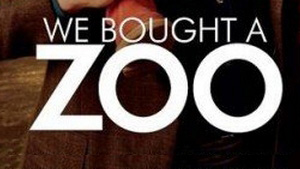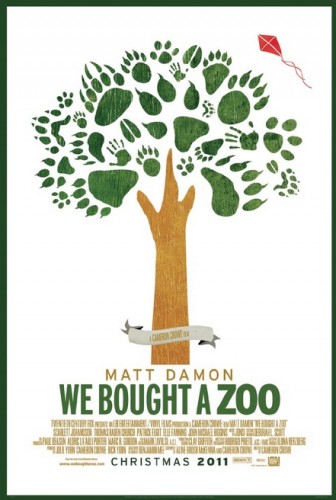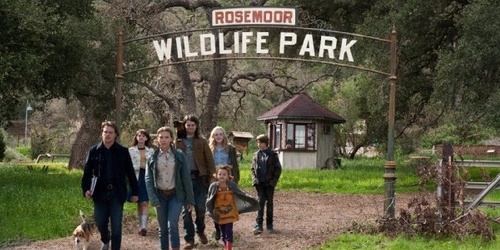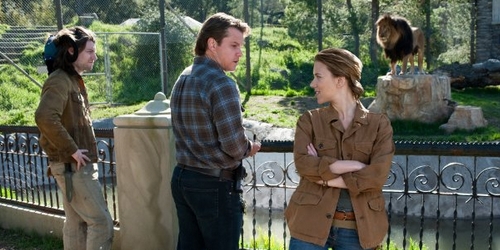
Editor’s Note: Go,See,Talk presents this review of We Bought A Zoo from our guest contributing writer Andrew Crump (of A Constant Visual Feast). He’s going to be making some more appearances on G-S-T in the next few weeks so have a look at what he had to say about Cameron Crowe’s latest film and offer your thoughts below.
In an early scene in Cameron Crowe’s We Bought a Zoo, Scarlet Johansson’s beleaguered zookeeper whirls around on Matt Damon’s optimistic single father turned zoo owner and demonstrates the film’s greatest hindrance in one ham-handed chunk of dialogue. Neither Crowe nor the film has any faith in its audience to pick up on obvious details, minute or otherwise, on their own. Everything, whether it’s a big plot point or a small character trait, must be explained in as many words as possible; nothing less than overboard is acceptable. To a point, it’s endearing. To a much greater point, it’s frustrating and almost condescending. Refusing to employ anything approaching subtlety or nuance, We Bought a Zoo constantly goes way beyond what’s absolutely necessary to tell a relatively straightforward story of hope and family and spiritual renewal.
We Bought a Zoo ostensibly tells the story of Benjamin Mee (Matt Damon), a widower and single father in desperate need of a  change to uplift both
change to uplift both
himself and his children, Dylan (Colin Ford) and Rosie (Maggie Elizabeth Jones). Benjamin eventually comes upon the idea of moving out of their old house; in the ensuing hunt, the Mees are shown a property which comes packaged with its very own run-down zoo. Benjamin immediately leaps at what he sees as an opportunity to start fresh, and for two hours he and the rest of the primary characters learn valuable lessons about life and themselves.
Therein lies the other major roadblock in We Bought a Zoo; it’s unapologetic in its blatant falsity. Anyone will tell you that the average biopic plays fast and loose with facts and generally modifies the truth for the sake of making it story more palatable on film. Such is the nature of the genre. But Crowe doesn’t simply move the pieces of the Mees’ story around enough to make them fit better on the big screen. He instead takes a sledgehammer to reality for the purpose of making emotionally manipulative and saccharine holiday entertainment. It’s one thing to alter circumstances, but to reinvent a family’s entire story is another entirely. Had the goal been to achieve something human and real, maybe that wouldn’t matter.
But We Bought a Zoo goes for the more maudlin jugular, and in the most contrived and overstated ways possible. Nothing here is left to the imagination; every character plainly dictates what they represent and where they stand in the grand scheme of the plot. Kelly (Johansson) is exhausted from her work, to which she dedicates most of her free time at the loss of a personal life; Dylan is brooding and emotional and angry over the trauma of losing his mother at a young age; Duncan Mee (Thomas Haden Church) is skeptical over his brother’s decision to take over operations of the zoo; zoo inspector Ferris (John Michael Higgins) is a smarmy jerk who has no faith in the zoo’s chances; and MacCready (Angus Macfadyen) hates Ferris and acts Scottish. It’s as though Crowe’s intentionally trying to save us the trouble of hashing out the characterizations of an ensemble cast for ourselves, though I use that term here quite loosely.
We Bought a Zoo treats its audience like simpletons. I’m not seriously suggesting that from behind the camera Crowe snickers quietly at what rubes we are, of course, but he doesn’t observe our intellect as moviegoers either. It’s a heavy-handed faux pas; Crowe’s film lays it on thick and doesn’t ever show any desire to relent its sensory assault on our emotions. Mee’s story is a compelling one, too, so to see Crowe treat it with such a clunky disregard for bona fide humanity is something of a shame. His is the sort of larger-than-life yarn that feels like it belongs in a film and even originates from one; it’s fantastical enough in its own right. How does turning up the volume on the melodrama dial past eleven serve the story?

This isn’t to say the film is a total wash; to Crowe’s good fortune there are a number of cast members who shine brightly enough to make the experience pleasant. Damon’s had a respectably full year between this, Contagion (in which he also plays a single dad), and The Adjustment Bureau, and I think all of these but Soderbergh’s worldwide epidemic film showcase exactly how great acting can save a middling film. Case in point, Damon is so watchable in we Bought a Zoo that he raises the film to another level all on his own in the face of awkward pacing and overzealous, cloying storytelling. If there ever was a question about what an actor’s job is, Damon provides the answer with his performance here.

In fact, most of the film’s cast turns out pretty solid work overall– the only thing holding any of them back is the script and Crowe’s direction. Yet they soldier on and manage to do as much as they can with what little material they’re given. Johansson particularly shows a spark of life, and she imbues Kelly with tenacity along with more nurturing qualities, which all feel appropriate for a zookeeper and work to her advantage when managing her human relationships. Johansson tends to be hit or miss for me, but she’s very solid here and compliments Damon’s nice guy act very well. Equally good, if not occasionally better, are Haden Church, Macfadyen, and Higgins, who mostly are relegated to comic relief but tackle the assignment with relish (particularly Higgins, who can score laughs just by raising his eyebrow suggestively). The genuine humor they provide makes for a nice break from the film’s oppressive intention to uplift us.
G-S-T RULING:
And that kind of represents the weird dichotomy of We Bought a Zoo. At the end of the day, the film’s only mission is to ensure that no one leaves the theater without moistened eyes, and it resorts to extreme measures to achieve that end. Crowe isn’t coaxing us into opening up to the film as much as he’s strong-arming us into feeling sentimental, which is effective enough that We Bought a Zoo works as a tearjerker– if not a particularly honest one. Maybe if Crowe allowed us to buy into the film on our own terms, We Bought a Zoo might be a more meaningful film. As it stands, it’s middle-ground family entertainment, competently made but in desperate need of having the volume turned down on the sappiness.

